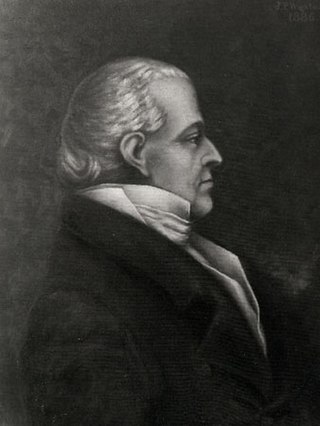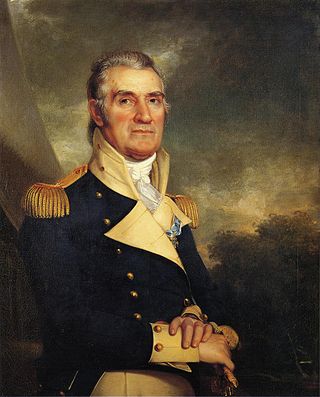Related Research Articles

Richard Henry Lee was an American statesman and Founding Father from Virginia, best known for the June 1776 Lee Resolution, the motion in the Second Continental Congress calling for the colonies' independence from Great Britain leading to the United States Declaration of Independence, which he signed. Lee also served a one-year term as the president of the Continental Congress, proposed and was a signatory to the Continental Association, signed the Articles of Confederation, and was a United States Senator from Virginia from 1789 to 1792, serving part of that time as the second president pro tempore of the upper house.

Thomas Fitzsimons was an Irish-born American Founding Father, merchant, banker, and politician. A resident of Philadelphia, Fitzsimons represented Pennsylvania in the Continental Congress, was a delegate to Constitutional Convention, and served in U.S. Congress. He was a signatory of the Constitution of the United States. A slave owner, Fitzsimons was an early proponent of abolishing the slave trade in the newly formed nation.

James McHenry was a Scotch-Irish American military surgeon, statesman, and a Founding Father of the United States. McHenry was a signer of the United States Constitution from Maryland, initiated the recommendation for Congress to form the Navy, and was the eponym of Fort McHenry. He represented Maryland in the Continental Congress. He was a delegate to the Maryland State Convention of 1788, to vote whether Maryland should ratify the proposed Constitution of the United States. He served as United States Secretary of War from 1796 to 1800, bridging the administrations of George Washington and John Adams. At the time of his death, McHenry owned 10 slaves, most of whom either worked as household servants or maintained his estate.

William Pinkney was an American statesman and diplomat, and was appointed the seventh U.S. Attorney General by President James Madison.

Robert Wright was an American politician and soldier who fought in the American Revolutionary War.

Samuel Smith was an American Senator and Representative from Maryland, a mayor of Baltimore, Maryland, and a general in the Maryland militia. He was the older brother of cabinet secretary Robert Smith.
Thomas Sim Lee was an American planter, patriot and politician who served as Maryland Governor for five one-year terms, as well as in the Congress of the Confederation (1783–84), Maryland Ratification Convention of 1788 and House of Delegates in 1787. He also held local offices and owned many town lots in Georgetown (which became part of the new federal city, Washington, District of Columbia, and spent his final decades operating "Needwood" plantation in Frederick County, Maryland. In addition to working closely with many of the Founding fathers, he played an important part in the birth of his state and the nation.

Joseph Kent was an American politician and planter who was a United States Senator from Maryland, serving from 1833 until his death in 1837. He also served in the House of Representatives, representing the 2nd congressional district of Maryland from 1811 to 1815 and again from 1819 to 1826, and as the 19th Governor of Maryland from 1826 to 1829.

Stevenson Archer was a judge and United States Representative from Maryland, representing the sixth district from 1811 to 1817, and the seventh district from 1819 to 1821. His son Stevenson Archer and father John Archer were also U.S. Congressmen from Maryland.

George Corbin Washington was a United States Congressman from the third and fifth districts of Maryland, serving four terms from 1827 to 1833, and 1835 to 1837.
John Andre Hanna was an American lawyer, slaveholder and politician who served four terms as a United States representative from Pennsylvania from 1797 to 1805.
Littleton Purnell Dennis was an American politician who served in the United States House of Representatives, Maryland House of Delegates, Maryland State Senate, and in the Maryland Executive Council.
Isaac Van Horne was a member of the U.S. House of Representatives from Pennsylvania.
William Lee Ball was a nineteenth-century politician from Virginia who served four terms in the U.S. House of Representatives from 1817 to until his death in 1824.
John Love was a nineteenth-century politician and lawyer from Virginia. Decades after his death, during the American Civil War, a man of the same name served in the Wheeling Convention, representing Upshur County, West Virginia, many miles westward.
Archibald Austin was a 19th-century slave owner, politician and lawyer from Virginia who served as a member of the 15th United States Congress.
Nicholas Ruxton Moore was a U.S. Representative from Maryland.

John Scott was a Delegate and a U.S. Representative from Missouri.
James Stephenson was an American politician and soldier who, as a Federalist, served in the Virginia House of Delegates as well as in the United States House of Representatives.

Benjamin Parke was an American lawyer, politician, militia officer, businessman, treaty negotiator in the Indiana Territory who also served as a United States federal judge in Indiana after it attained statehood in 1816. Parke was the Indiana Territory's attorney general (1804–1808); a representative to the territory's first general assembly (1805); its first territorial delegate to the United States House of Representatives (1805–1808); one of the five Knox County delegates to the Indiana constitutional convention of 1816; and a territorial court judge (1808–1816). After Indiana attained statehood, Parke served as the first United States District Judge of the United States District Court for the District of Indiana (1817–1835).
References
- ↑ Tufts University Archives
- ↑ Weil, Julie Zauzmer; Blanco, Adrian; Dominguez, Leo (January 20, 2022). "More than 1,700 congressmen once enslaved Black people. This is who they were, and how they shaped the nation". Washington Post . Retrieved January 30, 2022.
- ↑ "For sale: 5 BR home with many stories". Chicago Tribune . November 19, 2006.
- United States Congress. "Archibald Van Horne (id: V000043)". Biographical Directory of the United States Congress .
